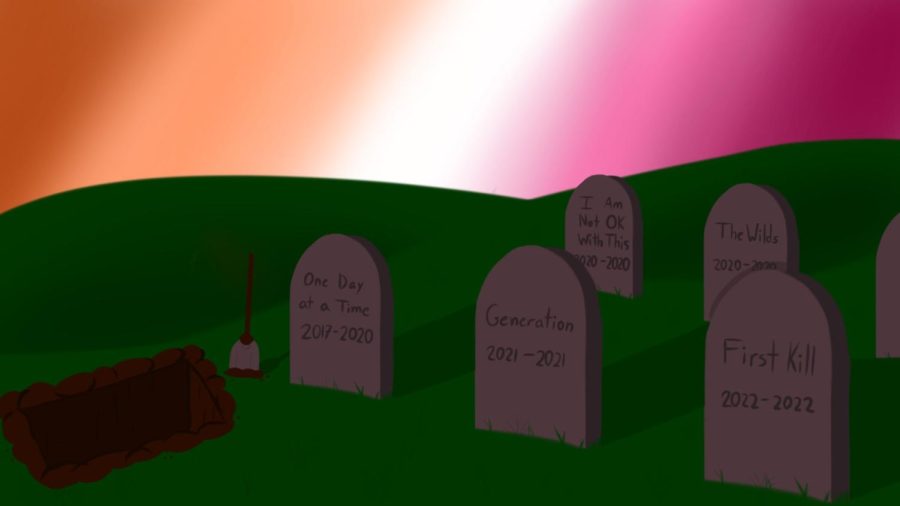I love the show “She-Ra and the Princesses of Power.” Every time I re-watch it, I’m reminded of how glad I am that it got to finish its story.
In recent years we have been seeing a lot more shows and movies that feature queer characters: “Love, Simon,” “Heartstopper” and “Love, Victor” to name a few. While I love these shows and the representation they portray, they all focus on queer men and lack queer female representation.
Over the past few years, there has been a trend of shows with queer female representation being abruptly canceled. “The Wilds,” “First Kill,” “I Am Not Ok With This,” “Everything Sucks” and “The Owl House” are all examples of shows with a heavy focus on queer women that were canceled after only one or two seasons.
These shows meant a lot to women of the queer community because it is rare to find a show that provides that kind of representation. On top of that, shows such as these normalize queer characters in mainstream media. By canceling them, networks and streaming services minimize that message of normalcy.
“There’s still a lot of male privilege,” Associate Director of Journalism and Media Studies Dr. Nathian Shae Rodriguez said. “When we look at the history of media representation, and even studying queer representation, it’s still white, male, cis-gender, able-bodied and young.”
“Love, Victor” does a good job of showing both queer men and women, but still focuses on the men most of the time. And while shows such as “Heartstopper” and “Young Royals” are granted multiple seasons by streaming services, there are many shows featuring queer women that are being wrongfully canceled.
Much of queer representation leans more towards queer cis-gender white men because the people in charge of these shows have a bias towards those groups. They believe that representing that demographic will get them the most money.
The male privilege in queer media is so strong even the Jeffrey Dahmer show on Netflix has been labeled a LGBTQ+ show. Jeffery Dahmer was a gay serial killer and sex offender in the late 1970s to early 1990s. The label has since been removed but the incident not only shows male privilege but also puts queer people in a bad light.
The film and television industry is a huge money maker. Producers and other people in charge want to produce shows that will make them the most money. Queer women aren’t what the film industry deems as profitable, therefore executives avoid producing that kind of content, or they cancel it when it stops making them money.
The times when we do get queer female characters, they tend to be oversexualized because they are produced and written by straight men.
“When we look at the representation historically, when women who are attracted to women are in the media, it happens to be in very sexualized situations, and that’s usually for the consumption of men,” Rodriguez said.
Shows like “Riverdale” aren’t a good representation of queer women because they showcase oversexualized queer women and romanticize toxic relationships.
While I always appreciate the queer representation in shows and movies, I didn’t realize how much the canceling of these shows meant to people. It’s probably because I, myself, didn’t watch some of those shows or maybe I didn’t like them as much as other people.
After hearing about how upset people were, it started to hit me that this was a bigger issue than I realized. It really is important to have queer people, especially queer women, in shows and movies if we want to have more well-rounded representation in media.
Sophomore Olivia Newell works at The SDSU Pride Center which aims to provide a safe space for all LGBTQ+ students and community members.
“I think it has to do with the intersectionality of the different systems of oppression, because it does live at the crossroads of sexism and homophobia,” Newell said.
They said as an example: queer women stray way from the hyper sexualization that is men generally expect from women.
“If you don’t like men then you don’t really fit the male gaze and that’s what the basis of images of women is in the media,” Newell said.
Newell also notes that there needs to be more characters in shows and movies that are queer but aren’t used to “check the queer box.” Newell speaks about Netflix’s recent movie, “Do Revenge,” and said it wasn’t their favorite movie. However, they liked that one of the main characters was gay but that wasn’t her main trait — she was still a normal person.
Many shows like to focus on the tragedy of being queer covering topics like the struggles of coming out which is relatable but there are other things to talk about when it comes to queer people. “We need shows like “Heartstopper” that are just two people that are gay just because they’re gay and that’s it,” Newell said.
Overall, there needs to be more representation in the media but this is difficult with it being a profit fueled industry. It’s nice when the occasional movie or show has queer female representation, but it would be nicer to see it more normalized. Hopefully, with more people caring and speaking out about the topic, things will start to change within the industry.
Until then we will continue to cherish the representation that we get and mourn it when it is taken away.









